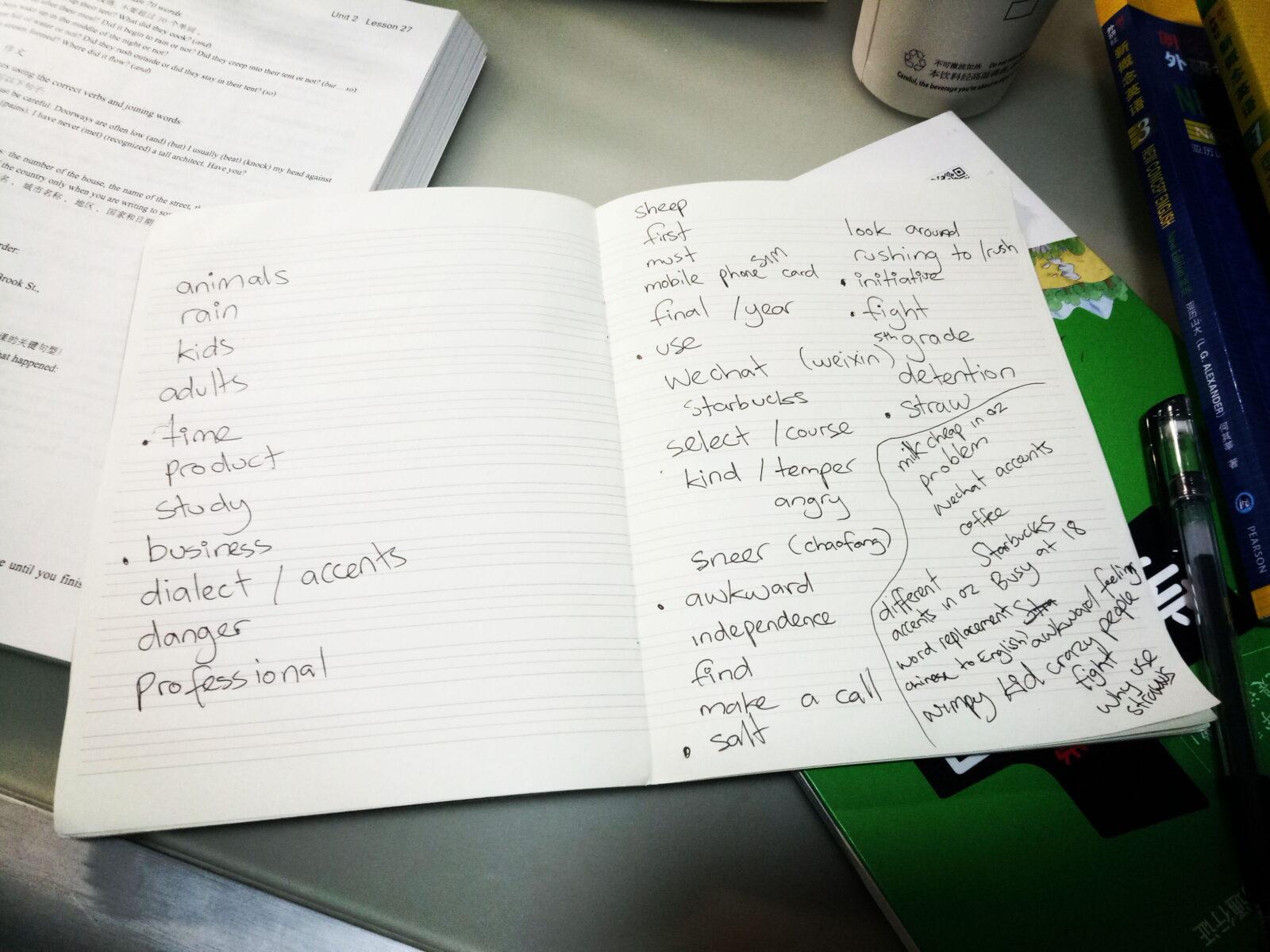China, Guangzhou, Tiyixi Lu (体育西路) | World International English Classes
In China, Guangzhou, I left home at 6:50 pm, caught a train from Shayuan metro station(沙园站), ate some food on the way, and now 40 minutes later at 7:30 pm I arrived to Tiyuxi Lu (体育西路站).
It is still raining, but not as badly.
I have 15 minutes to arrive to my teaching job in China as an English teacher – English As A Second Language (ESL) – to conduct one small spoken English class with 4 people.
Preparing Class Activity Paperwork
Once I arrived to World International English in China, Guangzhou, I printed copies of the handouts from the class activity folders. I was curious that the paperwork for the spoken English (ESL) class had already been placed on the table.
Then the British English teacher came and said hello to me.
As he is standing in our education department, I said,
“I think the paperwork is already on the table for this handout.”
He said, “Yeah, I put it there for you.”
I thought, “You could have just told me that. That would have saved me from looking through the folder!”
I said, “Oh, you did that. Thanks for doing that.”
Then he shooed off into his spoken English (ESL) class. I am not sure why he is being so polite of late.
Regardless, I took my handout into the class, room C2.
Student Introductions In The English (ESL) Class
Today’s spoken English (ESL) class was interesting. All three English-language students were in their twenties.
One student was an office worker. Another student was a girl in her mid-twenties. The third English student was a healthy male student who liked the gym. All students were ready to learn English.
I came into the classroom and said, “Hey, everyone.”
I looked over to one Chinese English-language student seated on the left of the classroom table who is an office worker for World International English.
I said, “Hey, you are in the class? Cool.”
He smiled.
He is the really outrageous, funny student that once sat behind the reception counter to floss with the girls at reception. His English level is much, much better than everyone else there. He is also outgoing and vivacious. He likes to crack jokes, and has the same personality as me.
Asking English-Language Students To Describe Their Day
One of the first teaching strategies I use to teach English in China is to ask everyone,
“How was everyone today?”
I pointed around the class, and heard their stories.
The student who works for World International English told me how he had to come in the rain from his dormitory to get to work today.
Another quiet student seated on the right of the classroom table said,
“I went to the gym today. Then I came to World International English.”
Then there was a girl, who was kind of cute. She was seated in the middle. It turns out that she is the sister of one of the student assistants at World International English in China, Guangzhou.
The way that I conducted the spoken English class was as per normal. It did not really bother me that one of my colleagues was in the classroom. We were all learning English.
Sometimes, when the funny student talks, he is really outrageous. He is talking over the rest of the class. I am trying to conduct it like a normal class.
Each one of the three English-language students has a chance to talk. But then he talks over the top of the others, so it is hard for me to conduct a class like that. At the same time I want the English student to have fun and be relaxed enough to learn English.
After I had talked to them for 10 minutes about how their day was, and how they arrived to World International English Teaching Academy, I became acquainted with each student through their introduction story.
Reading Aloud From Conversational Dialogue
Another of my teaching strategies is to have the English-language students read aloud from the conversational dialogue.
I said, “We are going to read from the conversational dialogue from lesson 3.”
The health-buff English student brought the wrong lesson material.
I said, “Oh no, lesson three. You can read from mine.”
Then we began reading.
One of the teaching strategies I have adopted to learn English optimally is to declare,
“We can read each person, A, B, C. You read sentence A, the next student reads sentence B, and the third student reads sentence C.”
There is no focus on English grammar, only on the articulation and pronunciation the English-language students make.
The student and colleague on my left always tried talking over me. You could say he was very charming.
Teaching English Pronunciation
The English-language students began to read aloud one line each from the conversational dialogue. I did not have to write down too many things. For them to learn English words however, I wrote down, “pig out”, “sustenance”, “fishing for compliments”, “found”.
- Pig out
- Sustenance
- Fishing for compliments
- Found
Once we went through the dialogue one time, I remarked,
“The word ‘found’ is very easy, but in English, you have to open up your mouth when you say words like ‘found’.”
Open-Mouthed Vowels In Pronunciation
Stopping the class to teach English pronunciation is another of my English (ESL) teaching strategies. The students were learning English when I explained,
“Most Chinese people keep their mouth closed and say a closed-mouthed O.”
I spent 5 minutes on this English word pronunciation problem, telling them, “Say ‘found’,” and getting them as a class to repeat the word “found”. We did this repeatedly for a few minutes.
Then I explained to them why those words in the English vocabulary are pronounced in that way.
Pointing to all like-sounding words written on the board, I told the students,
“Most of the words in English have this kind of open-mouthed pronunciation.”
“The letter ‘u’ in ‘sustenance’ is pronounced with an open mouth.”
“The letter ‘o’ in ‘found’ is also pronounced with an open mouth.”
“Most English words are pronounced with an open mouth. There are no words in the English vocabulary that sound the way you would pronounce those words in Chinese.”
This was a good method to learn English.
Accidentally Eat A Mosquito In English (ESL) Class
Somewhere in that lesson I think I ate a mosquito. I was talking normally, and then I felt a little twitch in the back of my mouth. I ate a small bug that flew into my mouth.
I coughed a bit, strained my voice, but like a trooper I persevered with the English lesson. Everyone looked at me a little unusual, as if to wonder, “What just happened to him?” This was not one of my teaching strategies. An insect did fly into my mouth during class time.
Teaching New English Words
From the conversational dialogue we moved the “new words” activity in the second part of the handout as a method to learn English vocabulary. Most of the new words I already taught them, which were, “slimy”, “sustenance”, “hunky”, “manly,”
- Slimy
- Sustenance
- Hunky
- Manly
The bodybuilder student asked me,
“What is the difference between hunky and manly?”
I had to go through that difference again in this English class.
Then I taught them “slimy”. In these instances, one of my teaching strategies to help the students learn English is to come up with the definition followed by an actual example.
I said, “Slimy is like a person who is trying to cheat you.”
The girl in the middle especially was listening to this.
I had to go through words that had a masculine and feminine meaning.
I said, “You can call a man or a woman charming, but you would normally call a guy hunky.”
English (ESL) Class Activity To Discuss Differences Between Private And Public Schools
The spoken English class lesson had come to the half-hour mark when I said,
“Let’s look at the activity now. It is actually an interesting activity.”
The activity was to have the students use English to discuss the differences between a boarding school, a private school, and a public school. There were 8 reference questions on the handout on this topic.
The bodybuilder student asked, “What is the difference between a private school and a public school?”
I took the English-language students through a long discussion on the differences between Chinese and Australian universities.
Going into long, English-language anecdotes on topics familiar to the students is one of my teaching strategies, as it allows the students to absorb lots of information, and then respond in kind.
I told them the whole story about how a 51% pass mark is all that matters when studying in Australian schools, whereas in China, you have to aim for a 100% mark.
The female student actually studies. She said she will finish her study in June.
Then I turned the conversation onto them, asking,
“Why do you think that is?”
One student said, “In China, grades matter.”
I asked, “Does every company ask you for your certificate? Because in Australia, once you finish high school, or school, or university, no one really asks you for your certificate.”
They said, “Yes, it is very important. You have to go to your interview and bring your certificate and marks with you.”
English Grammar: Learning “If” Statement With A Conditional Clause
Then we came to the next part of the English lesson, English grammar. The English grammar in this English lesson focused on the “if” statement with a conditional clause. I taught English like this before, so I had the confidence to teach these English-language students today.
English grammar teaching strategies rely on me being able to summarize the English grammar rules with an explanation, followed by a handful of examples to familiarize the students with, before I ask them all for one example sentence each with the grammar rule included.
I asked them, “I will give you a conditional statement. If it was not raining outside, I would probably go jogging tonight. That probably satisfies the first condition where it is possible but unlikely.”
Then I asked everyone, “Can you all give me one example of an ‘if’ condition.”
They all thought about it.
The funny student said, “If that girl talked to me, I would probably try to kiss her.”
I said, “Good.”
Then in quick succession I pointed to the female student.
The female student said, “If I took better care of my cats, then none of them would die.”
She was talking about a real situation that happened to her.
I said, “That is a good example of the third ‘if’ condition.”
Then the bodybuilding student used an example of the gym.
I said, “That is a good example too. If I go outside and it is not raining, then my shoes would not get wet, right?”
Then I did a karate kick, and said,
“If I didn’t do that karate kick yesterday and rip my jeans, I could probably wear those jeans today, right?”
They all laughed at me.
I summed up, “That is how you use ‘if’ in English grammar.”
Promoting My Online Website
The time quickly reached the hour mark. We had come to the end of the spoken English class. The class tonight went from 8 pm until 9:15 pm.
I said, “Alight, it is time to go everyone. Come on, come on!”
I was getting more energetic and excited now, not being as much of a teacher. They kept me there for an extra 15 minutes talking about my website.
They said, “I can’t believe that you stayed up until 6 am last night. Why did you do that?”
I said, “Because the morning is the best time for me to write my articles. If I do it in the day and go to the coffee shop, I get interrupted a lot.”
They asked, “Can I read it? Where is it?”
I said, “Of course. You can go to my website.”
I wrote down eleninovski.com.
The girl said, “Wow, you are such an inspiration.”
I said, “Yeah, I have written fifty articles about China so far. I still have more than one hundred to publish. Then I am going to try to write a book in the next six months.”
The funny English student to my left exaggerated,
“I am going to buy five of those books. I am going to get my friends to buy one each.”
I just laughed at him, saying,
“You have given me some kudos. Thank you.”
English (ESL) Class Concludes
I gave the English-language students an opportunity to talk casually after class, and placed less emphasis on me having to teach English.
I adopt this teaching strategy because sometimes the class ends awkwardly, and the students all need to rush to other classes, or other students need to enter my classroom to begin a new class.
Sometimes there are no classes afterwards, so I use this time to end the English lesson gracefully, so the students have ample opportunity to relax and ask pressure-free questions as a way to learn English.
The last English student out of the class was the funny student that is a colleague of mine in World International English.
Once all the students were happy to leave the classroom, I walked to the administration department, fetched my paperwork, and handed this to reception so I could sign for my classes today.
I had concluded my one English (ESL) class in China, Guangzhou for today.
Are you looking for suitable language exchange partners in China and abroad?


Diary Of A Mad Chaos is a daily diary written from March 1996 until today, of which individual books and book series have been created, namely “The Lost Years” an exploration of young, entwined love, the “Wubao In China (猎艳奇缘)” book series which provides an extensive comparative analysis of the cultural differences between Eastern and Western societies, and the book titled “Foreigner (华人)” an exploration of race relations in Australia.










